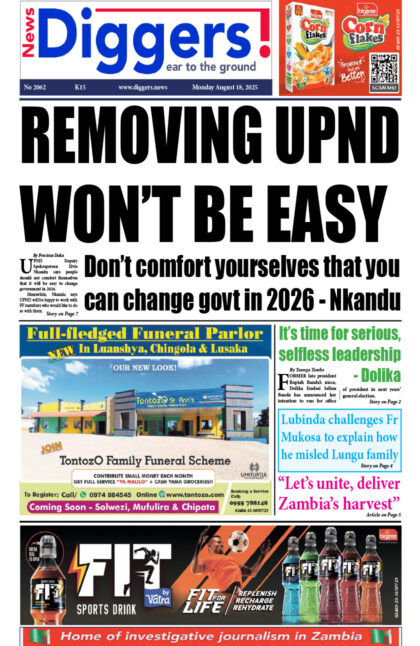The Indaba Agricultural and Policy Research Institute(IAPRI) says Zambia is actually the fifth hungriest country in the world.
Meanwhile, the Disaster Management and Mitigation Unit says the hunger which has hit mostly Western, Southern and Luapula Province is likely to worsen during the rainy season as some areas will be difficult to access.
Speaking during a breakfast meeting on the food security situation in Zambia, IAPRI senior research fellow Dr Rhonda Mukuka said 43 per cent of Zambians had experienced severe hunger this year.
“As IAPRI we did a survey and what we found as a country, we looked at the different levels of hunger; we looked at those that experienced little to no hunger, there are those that experienced moderate hunger and severe hunger. So at national level, the majority of the population experienced severe hunger about 43 percent experienced severe hunger. A few, about 20 something per cent, experienced little to no hunger and there are those who experienced moderate hunger. But we have the large part of the population that experienced severe hunger,” Dr Mukuka said.
“If you look at the provincial distributions, you will see Western Province having the biggest proportion of households that experiencing severe hunger and most of this is from places like Shang’ombo. So more than 60 per cent of the population in Western Province is actually raising the national average. Also Luapula and North Western Province, those are some of the provinces. The Global Hunger Index shows that as a country, 38 per cent are experiencing severe hunger. So it’s not so far different from our findings. At this level, 38 per cent, we are actually the fifth hungriest country in the world.”
She said Zambia had a 47 per cent prevalence of undernourishment.
“So we are 47 per cent to the prevalence of undernourishment which obviously is contributing more to having a higher percentage of the Hunger index. So if that is brought down, it might have a positive indication on the Hunger index,” Dr Mukuka said.
“We need long term measures to mitigate climate change. We need to see, we can manage with this climate change. One thing will be the promotion of small scale irrigation in places that experienced very little rainfall.”
She also said Zambia’s food security situation had worsened.
“The food security situation measured by the prevalence of undernourishment, the Hunger Index, the Household Dietary Diversity, it appears that the situation has worsened. As a country, if you want to compare with the few countries around, Zambia has the highest levels [of undernourishment] right now it is said to be at 46 percent meaning almost half of the population are said to be undernourished. I think there is only one country that is higher than us. This means there is something that is wrong,” said Dr Mukuka.
And IAPRI senior research fellow Dr Brian Mulenga warned that the food security situation would worsen if no assistance was rendered to the sector.
“We have seen that the previous season had a reduced harvest of not just maize but other crops and this worsened the food security situation. And then the limited information on stock levels as well as their allocations is likely to hamper the food relief efforts by government and other stakeholders; and that calls for efforts to expedite Zambia Grain information system so that information is readily available,” said Mulenga.
“And obviously, without any further assistance, the household food security situation will only get worse! This is going to reduce the level of effort that was put in the current production, which is likely to cause vigourous food insecurity budget.”
Meanwhile, DMMU disaster risk management assistant director Lenganji Sikaoma said the unit expected the levels of vulnerability to worsen during the rainy season.
“I am glad to sum up that results are speaking the same language, the hot spots are Western Province, Luapula and even Southern. I am coming from Shang’ombo I was there last week and I can tell you that it is a sorry site and we are in the rainy season and some of those areas will not be accessed. So I expect that the levels of vulnerability in those particular places will worsen. But I am elated to the fact that DMMU has upped it’s game. We have expanded our relief basket to not only just talking about cereals but we are also putting in the proteins and there are partners who are now putting in oils which I hope will improve the situation,” said Sikaoma.
























